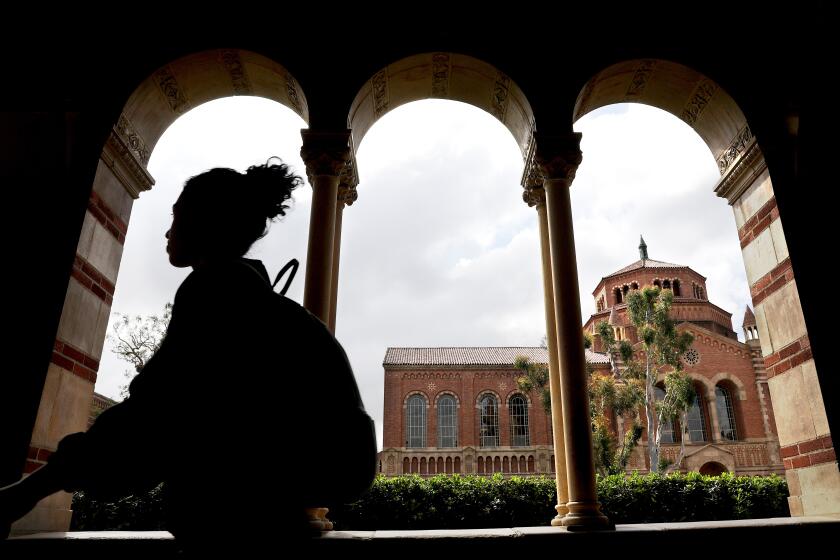Apodaca: A Daily Pilot columnist learns to find her voice

- Share via
Every family has its quirks. Lately, I’ve had reason to reexamine a few of the idiosyncrasies that were ingrained in me from an early age and which have haunted me throughout my life.
When I was a kid, my elementary school-teacher mom got me involved in community theater. Picture wholesome, youth-oriented plays based on fairy tales, or Christmas-themed productions containing messages about giving being superior to receiving. One summer I even enrolled in mom’s summer school theater arts class.
I relished everything about the theater — the chance to show off my acting chops, the camaraderie among cast members, the staging, the hair and makeup — and I fancied myself a promising thespian. So when I entered high school I auditioned for “Fiddler on the Roof,” my first musical, and landed a small speaking role. I was thrilled.
But when I told my parents the news, their reaction wasn’t what I had hoped for. They burst out laughing. Like, knee-slapping, doubled-over, can’t-catch-a-breath guffaws.
“You can’t sing,” they told me. “No one in our family can sing.” The prospect of seeing me in a musical was just about the most hilarious thing they could imagine.
Deflated, I nonetheless continued on with the production. I didn’t have any solos — of course I didn’t, I couldn’t sing — and during the big chorus numbers I mouthed the lyrics but didn’t emit any sounds and hoped no one would notice.
And that’s what I’ve been doing ever since my nascent thespian career came to an abrupt and humiliating end during my freshman year of high school: not singing.
Sure, over the years I’ve occasionally slipped and started to hum along with the car radio or joined in when others were singing. These mistakes earned me pained, pitying looks from companions and, I assumed, set off rounds of howling dogs. So I learned to shut down such impulses, sparing the ears of any living thing in my vicinity. What had been a family oddity became a phobia.
Sometimes in my dreams I would imagine myself belting out a ballad to an adoring audience, like Adele or Beyoncé. But, alas, those dreams were meant for another lifetime. In this one, I could only marvel at others’ musical talents.
Then recently something strange and wholly unexpected occurred. For my last birthday, my husband announced that he was giving me singing lessons.
What? You did what? I’m going to do what? Something went off-kilter in my brain. The idea of me singing in front of another human being didn’t compute.
But it was a thoughtful, generous gift, so I promised to give it a go.
I am now about five months along on this surprise journey, and it’s been quite an adventure.
The end of affirmative action hasn’t ended preferential treatment in college admissions as legacy admissions and other policies continue to favor select groups, writes Patrice Apodaca.
Once a week, via Zoom, I meet with my wonderful, endlessly patient teacher. Anyone who has had vocal training will no doubt be familiar with the breathing exercises, warm-ups and methods of strengthening the vocal cords that I have learned from her, and which I practice religiously.
Miracle of miracles, I am gradually improving. I’ll never be Adele; no arias from “Madam Butterfly” are in my future. But so far, no dogs have wailed in agony, and I can now envision the day — not there yet, but I’m on my way — when I will feel comfortable chiming in when others strike up a tune.
I have also discovered that, underlying my halting progress, there’s a larger lesson, one that involves banishing the ghosts from my past and being brave enough to try for something I once considered beyond my reach. Indeed, my singing lessons are also part therapy sessions, with my teacher continually counseling me to quiet my “critical mind.”
You can sing, she assures me. You are singing. Each time she says it, I believe it a little more.
Though not as significant as my musical adventure, another oddity from my childhood has resurfaced recently courtesy of the blockbuster “Barbie” movie.
That’s because I never had a Barbie doll.
I wanted one in the worst way. All my friends had them, along with the various accoutrements — the clothes, the cars, the Dreamhouse, the whole deal. To my child’s eye, they represented the fantasy of ideal womanhood that we all yearned to realize.
Not that I didn’t have dolls. In fact, I had lots. But they weren’t fun, they were educational, like the dour pair in Hungarian peasant dresses that my aunt brought back from her travels. They sat on a shelf, never to be played with. Far better to learn about another culture than become distracted by frivolous Barbie.
As with the singing aversion, I know my parents meant well, and I don’t begrudge their attempts to steer me toward what they believed were suitable activities. Singing and girly-girl dolls, no. Books and intellectual pursuits, yes. I’m more interested in “Oppenheimer.” I have my family to thank for that preference.
But at some point, we can choose to bust loose from the past and venture into new territory. What is life without a few leaps into the unknown?
That’s why, even though I lack the deep connection that drives pink-garbed throngs into spasms of Barbie worship, I do plan on seeing the film. Will I understand every inside-Barbie reference? Probably not. Will I still enjoy it? I’m sure I will.
I hear it has some catchy musical numbers. Maybe I’ll sing along.
All the latest on Orange County from Orange County.
Get our free TimesOC newsletter.
You may occasionally receive promotional content from the Daily Pilot.





